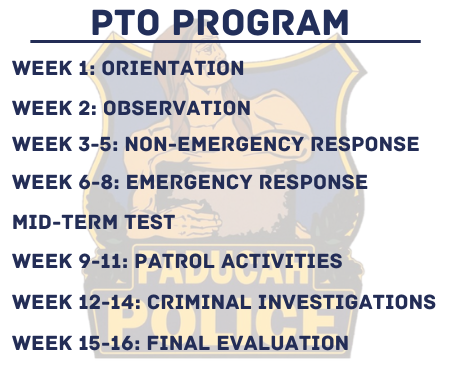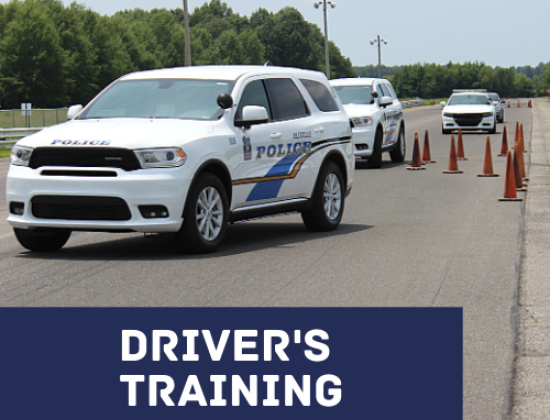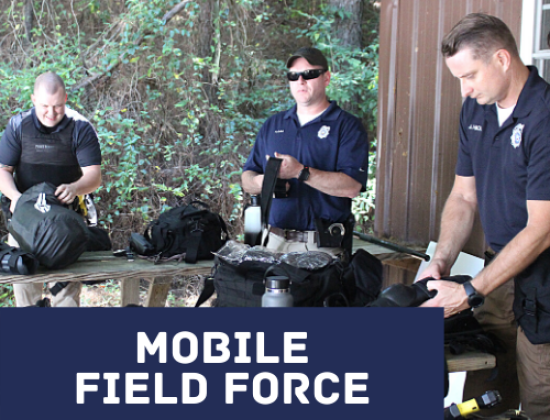
Training Officer
The Paducah Police Department emphasizes the importance of training for maintaining the safety and well-being of not only Paducah Police Officers but also the community they serve. The Paducah Police Department's Training Officer is responsible for organizing and scheduling all training for sworn and civilian employees. They oversee all of the department's instructors and also manage all equipment, weapons, ammunition, and upgrades for the department. The Training Officer also acts as the point of contact for new recruits and is their liaison officer until they graduate from the academy. If you have any questions about the Paducah Police Department's Training Unit, call 270-444-8534.
Annual Training
State statute mandates Kentucky Police Officers successfully complete an in-service training, appropriate to the officer's rank and responsibilities, of 40 hours each calendar year. The Paducah Police Department utilizes in-house training beyond the 40-hour state in-service. Some of the in-house training includes annual firearms training, de-escalation training, driver's training, defensive tactics training, CPR/AED and first aid, Taser training, active shooter response training, leadership training, officer wellness training, and Narcan training. The Paducah Police Department receives, on average, more than 9,000 hours of training per year.
Train-the-Trainer
In-house training at the Paducah Police Department utilizes Train-the-Trainer classes. Train-the-Trainer allows a couple of officers to attend instructor-level courses with the expectation that they return and administer training to the rest of the workforce. The Paducah Police Department's instructors are proficient in many areas including firearms, defensive driving tactics, Taser, PepperBall, chemical munitions, defensive tactics, civil rights training, Verbal Judo™, CPR/AED and first aid, and mobile field force.
Police Training Officer Program
Post-academy training has always been an essential part of a recruit officer's immersion into the complex job of a police officer.
The Police Training Officer (PTO) Program, places more emphasis on the process of adult education through "problem-based learning" (PBL). The ideas of PBL focus on teaching the recruit the processes of solving problems, rather than pointing them to one pre-drawn conclusion. The nature of police work makes PBL a good match for training recruit officers.
The PTO Program is 16 weeks in length. During each of the four phases, following the orientation and observation weeks, the recruit and the Police Training Officer complete an evaluation of the recruit's performance. A Mid-Term Test is given at the halfway point, and if the recruit is learning at the appropriate rate, they will advance to the next phases. The Final Evaluation is judged by a panel of Police Training Officer Program Instructors.
The first week of the program is one week of classroom orientation. This provides the recruit with agency specific information such as radio codes, local procedures, and orientation. After the one-week orientation, the recruit is placed with a trained PTO, and they hit the streets. The second week is simple observation, where the recruit rides along with their PTO while on duty. This allows the recruit to watch and ask questions about the various interactions an officer experiences every day.
The following four phases are each three weeks long. During each phase, the recruit and PTO complete one phase evaluation of the recruit's performance. After the first two phases, Non-Emergency Response and Emergency Response, the recruits have a Mid-Term Test to assess their progress. If they are learning at an appropriate rate, they will advance to the final two phases, Patrol Activities and Criminal Investigations. The last two phases are followed by a two-week final evaluation that consists of practical scenarios and a final exam.
The evaluation team usually consists of the Police Training Supervisor the recruit is assigned to or the Police Training Coordinator, the Police Training Officer who had the recruit for the final evaluation phase, and two other Police Training Officers. The Board of Evaluators will make a final recommendation to the Assistant Chief of Operations and the Chief of Police as to the recruit's training status.









